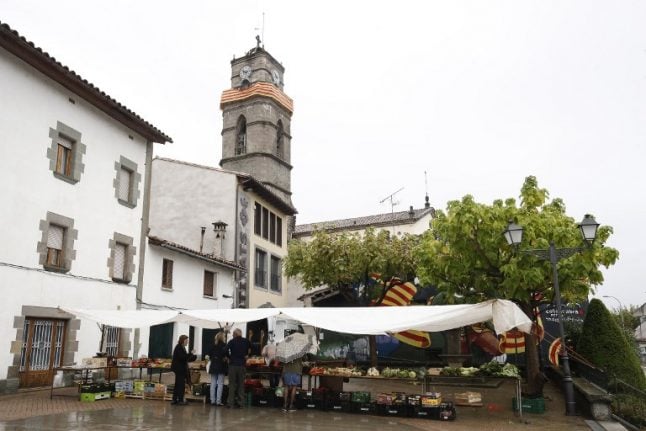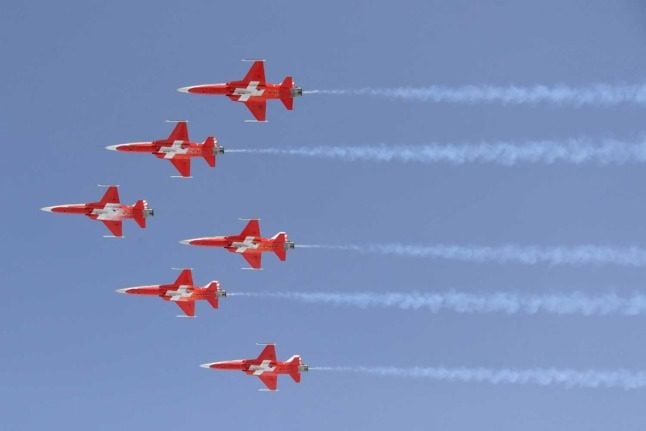And they are determined to vote in an independence referendum in Catalonia slated for October 1st deemed illegal by Madrid.
During Catalonia's last regional election in 2015, pro-separatist parties captured 91.6 percent of the vote in L'Esquirol, which is nestled in the middle of corn fields some 90 kilometres (55 miles) north of Barcelona and is home to around 2,200 people.
That compares to the 47.6 percent of the vote which the parties won overall in Catalonia, a wealthy northeastern region of Spain with its own language.
At lunchtime last week, at the popular “Rovi” snack bar the newscast on Catalonia's regional TV station opens with a “macro police operation” carried out in Barcelona to stop the referendum which included the arrest of 14 top Catalan government officials.
“They want to scare us. But the more they complicate the task, the more we want to vote,” the 54-year-old manager of the bar, Juan Rovira, who goes by the name Johnny, said before calling out: “Everyone to the polls!”.
“In your village, you are at home, you don't hurt anyone by expressing yourself by voting. And after if they say 'It is a vote that does not count' we will see,” he added.
If the “Yes” side wins the referendum which has been deemed unconstitutional by the courts, Catalonia's pro-separatist government has said it will start working towards the establishment of an independent Catalan
republic.

'In our DNA'
In L'Esquirol, which means “the squirrel” in Spanish, even the church's bell tower is decorated with a red and yellow Catalan flag and signs calling for a “Yes” vote in the referendum decorate many of its stone houses.
“In central Catalonia, outside of big cities, it is not extraordinary that people vote for independence,” said L'Esquirol mayor Alex Montanya, 43, a leftist separatist.
“For us, independence is already there. No one has taught us it, it's in our DNA, we just want to govern ourselves.”
He is one of over 700 Catalan mayors — out of a total of 948 — who has been threatened with criminal prosecution for agreeing to provide facilities to hold the referendum.
Asked what he would do if police come to the town hall on referendum day, Montaya said: “It will not happen.”
“A policeman would be powerless against the unshakeable will of the people. It's a matter of faith.”
The “Rovi” is full of pensioners who play cards and grumble against Spanish Prime Minister Mariano Rajoy's conservative Popular Party (PP) which they complain could remain in power eternally despite being tainted by a series of corruption scandals.
Support for the PP is marginal in Catalonia, capturing just 13 percent of the vote in the last general election in 2016. It got just 33 votes in L'Esquirol.

Resentment
Among the town's separatists is Xavier Pamies, 58, who is best known among locals for having translated J.K. Rowling's popular “Harry Potter” books into Catalan even though he has also translated other British, French and Portuguese authors.
He said support for independence soared after Spain's Constitutional Court in 2010 struck down parts of a 2006 Catalan autonomy statute that granted the region more powers even though “feelings of Catalanism and resentment towards centralist Spain have existed for decades.”
“The constant discriminations on the part of Spain towards my country (Catalonia) have logically increased my desire to break away,” he told AFP.
He cited as examples “attacks on the Catalan language and education system”, “the lack of investment in infrastructure” and “fiscal injustice”.
“We could have reached an agreement if Madrid's response (to Catalan demands) had not always been 'no' and we would not be where we are now if we had organised a legal referendum, even if it was in the entire country,” Pamies said.
'Dictatorship'
Even the town's Roman Catholic priest, Pol Badibanga, who is from the Democratic Republic of Congo, preaches the cause of the independence movement.
“The people act with non-violence. They are not going to send soldiers to prevent voting, that would be a dictatorship,” the 50-year-old said.
Like in the rest of Catalonia, all subjects at L'Esquirol's primary school are taught in Catalan.
But at a nearby cafe terrace nine alumni of the school, a group of men and women aged 18-30 who are all in favour of independence, complain that in 2012 Spain's education ministry wanted to “Spanishize” Catalan students.
One of them, Albert Tarres, 25, who works at a pig slaughterhouse, said Madrid “will not solve anything though prohibitions or arrests.”
“It causes more and more anger,” he added.
By Laurence Boutreux / AFP



 Please whitelist us to continue reading.
Please whitelist us to continue reading.